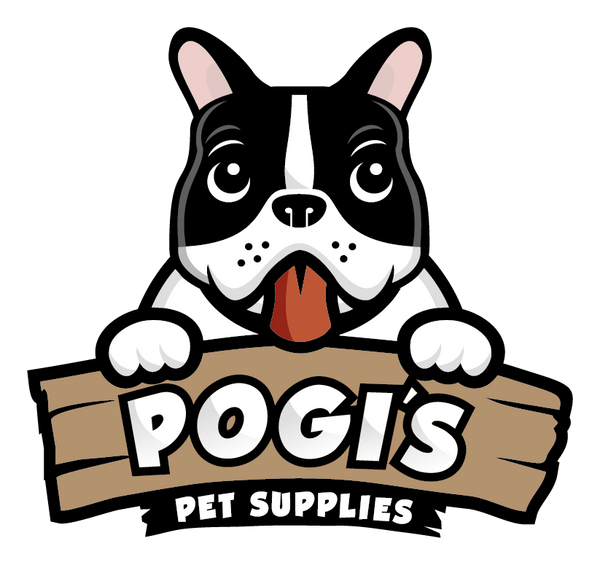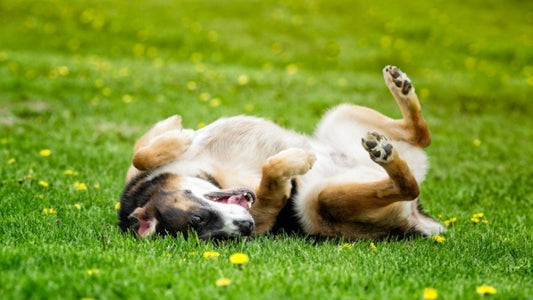If your dog makes the living room smell like a mystery locker room even after a bath, you’re not the only one facing this puzzle. Many dogs have a way of carrying odors that seem to stick, no matter how often you scrub.
Sometimes it’s just your pup finding something disgusting to roll in outside. Other times, the smell hints at bigger issues like skin infections, ear problems, or dental disease. Even food choices and a dog’s skin condition can add to that stubborn, bad smell.
This blog is here to help you spot the common reasons behind that dog stink and share simple, vet-approved fixes that keep the bad odor from taking over your home. And yes, we’ll talk about everyday helpers too, like gentle wipes that make life easier between baths.
So, why does your dog smell so bad? Let’s find out.
Common Reasons Why Dogs Smell Bad
Poor Dental Hygiene

Few things can clear a room faster than a dog with bad breath. While it might be tempting to blame last night’s kibble, the real culprit is often poor dental hygiene. Plaque and tartar buildup create the perfect environment for bacteria to thrive, and over time, this leads to gum irritation and infections that make your dog smell bad.
In advanced stages, the problem goes beyond just an unpleasant odor. Periodontal disease can cause pus around the gums, drooling with a foul odor, and even pain when chewing. What makes it sneaky is that even dogs with white-looking teeth are not safe. Studies show that 80 to 90 percent of dogs over three years old develop some form of periodontal disease, especially smaller breeds with crowded teeth.
When ignored, dental disease doesn’t just cause bad breath. Bacteria from the mouth can spread into the bloodstream, leading to infections in other parts of the body. Regular brushing, vet dental care, and safe chew toys are not just about fresh breath; they protect your dog’s long-term health.
Ear Infections
If you’ve ever noticed your dog’s ears giving off a sour or cheesy odor, you might be smelling more than just dirt. Ear infections are one of the most common reasons a dog stinks, and they can turn into a persistent odor that’s hard to ignore.
Breeds with floppy ears, like Cocker Spaniels or Basset Hounds, are especially prone because their ear canals trap warmth and moisture, creating the perfect breeding ground for bacteria and yeast.
You’ll often see the signs before the smell gets unbearable. Head shaking, constant scratching, redness inside the ear, or discharge are all red flags. Left untreated, these infections can cause serious pain and long-term ear problems, so it’s important not to brush them off as just a bad smell.
Cleaning the ears regularly with gentle products can help reduce buildup, but when an infection sets in, home remedies rarely do the trick.
Vets often prescribe medicated solutions with ingredients like chlorhexidine to fight bacteria, miconazole to treat yeast infection, and phytosphingosine to restore the skin’s natural barrier. In some cases, pramoxine is used to soothe irritation and give your furry friend quick relief. These products may sound clinical, but they’re often more cost-effective than endless over-the-counter cleaners because they tackle the root of the infection instead of just masking the odor.
Anal Gland Issues
You’re relaxing on the couch when suddenly your dog hops down and starts scooting across the carpet. Moments later, a sharp fishy odor hits your nose, and no amount of air freshener can cover it. That smell often comes from the anal glands, two tiny sacs tucked just inside your dog’s rear.
Normally, these sacs empty naturally during bowel movements, but when they don’t, they can become impacted or infected. This buildup leads to that signature fishy odor along with obvious signs of discomfort like excessive licking, scooting, or struggling to sit comfortably.
In mild cases, a veterinarian may simply express the glands to relieve pressure. Chronic infections may require antibiotics, dietary adjustments, or even surgery. If your dog smells bad in this particular way, it’s best not to attempt home remedies. A vet can ensure your furry companion gets quick relief while ruling out other underlying health issues.
Skin Infections or Allergies
Ever notice a dog that smells musty even right after a bath?
That stubborn odor often points to skin issues rather than surface dirt. Bacterial infections or yeast overgrowth on the skin can make your dog’s fur greasy, flaky, and smelly, leaving behind an unpleasant odor that doesn’t wash away easily.
These skin problems are often connected to underlying allergies, whether from food, pollen, or even household dust. When a dog suffers from chronic itching, redness, or fur loss, the constant irritation weakens the skin barrier and makes it easier for bacteria and yeast to spread.
In breeds with deep skin folds, like Bulldogs or Shar-Peis, the problem can be even worse. The folds trap heat and moisture, creating a perfect breeding ground for infection.
If your dog’s skin smells bad or you see signs of irritation, a trip to the vet is essential. Treatment might involve medicated shampoos, antifungal creams, or allergy management through changes in diet and environment. Addressing these skin issues early not only reduces the bad odor but also makes life far more comfortable for your furry friend.
Diet & Digestion

Sometimes the cause of a dog’s odor isn’t on the outside at all. It starts with what goes into their bowl. A poor diet loaded with fillers, artificial additives, or low-quality proteins can upset digestion, leading to foul-smelling gas, bad stool odor, and even a coat that gives off an unpleasant smell.
Food intolerances also play a big role. Dogs sensitive to common ingredients like grains, chicken, or dairy may develop skin issues alongside digestive problems, which only adds to the overall dog odor.
If your furry friend has recurring gas, itchy skin, or a dull coat with a persistent odor, food could be the hidden culprit.
Switching to a high-quality, balanced diet often works wonders for both health and smell. A veterinarian can help identify potential food sensitivities through elimination diets or testing, making it easier to choose ingredients that support healthy digestion and reduce bad odor from the inside out.
Dirty Paws or Outdoor Bacteria
You might give your dog a bath, only to have them smell bad again after a single romp in the yard. That lingering odor often starts with their paws. Every step outside brings contact with puddles, soil, and even animal waste, all of which carry bacteria that cling to a dog’s skin and fur.
Once indoors, those bacteria release compounds that create the classic “wet dog smell,” especially when the paws stay damp.
Rainy walks and muddy seasons make this problem even worse, as moisture gives bacteria and yeast the perfect environment to thrive. The result is a musty smell that can spread from the paws to carpets, furniture, and even your dog’s coat if left unchecked.
Regular paw cleaning can go a long way in preventing the buildup of bacteria and reducing bad odor. Gentle grooming wipes or a quick rinse after outdoor play help remove dirt before it settles in, keeping both your furry friend and your home fresher.
Infrequent Grooming or Bathing
When grooming gets delayed, your dog’s coat becomes a magnet for dirt, oils, and allergens. Over time, these build up on the skin and fur, creating an odor that sticks around even after a quick wipe-down. A dog that isn’t brushed or bathed often enough will eventually carry a bad smell simply because the coat isn’t being maintained.
But there’s another side to this problem. Bathing too often strips away the natural oils that keep your dog’s skin healthy. This can lead to dryness, irritation, and even secondary infections, all of which bring their own unpleasant odor.
The goal is not to bathe too little or too much but to find the sweet spot that works for your dog’s breed, activity level, and coat type.
Regular brushing between baths helps reduce odors, keeps the coat healthier, and allows you to notice early signs of skin or ear problems. With the right schedule, your furry friend stays comfortable and doesn’t carry that lingering smell into the house.
Underlying Health Conditions
Sometimes a dog’s odor has nothing to do with dirt or grooming at all. If your furry friend smells unusual even after regular baths and cleanings, the cause may be a deeper health problem.
Conditions such as diabetes, kidney disease, or metabolic disorders can change the way a dog’s body smells, creating scents that range from sweet to sour or even ammonia-like.
These odors are more than just unpleasant; they are often the body’s way of signaling that something is wrong inside. For example, kidney disease can make the breath smell like urine, while diabetes may give off a sickly-sweet scent.
If your dog’s smell doesn’t improve with normal care, it is important not to dismiss it as just a quirk.
Instead, take it as a sign to schedule a visit with your veterinarian. Addressing these underlying problems early can not only clear up the odor but also protect your dog’s overall health.
How to Get Rid of Bad Dog Smell?
1. Wipe Down with Hypoallergenic Dog Wipes (Pogi’s)

A big reason dogs smell bad is the buildup of everyday grime. Food residue, drool, pollen, and dirt often collect on your dog’s paws, belly, and around the mouth. If left alone, this turns into a persistent odor. Regular wipe-downs help remove these particles before they cause problems.
Baths are not always practical, especially for dogs that dislike water or during colder months. This is where Pogi’s Dog Wipes shine. They offer a quick, waterless clean that keeps your dog fresh between full baths. Many pet owners find them especially useful after walks or muddy playtime.
Since they are hypoallergenic, you can use them safely on sensitive spots such as the outer ears, skin folds, or even the face. These areas are prone to bacterial and yeast growth, which are common reasons behind bad odor.
Unlike fragranced wipes that simply mask the smell, Pogi’s are fragrance-free, plant-based, and free from alcohol or parabens, making them safe even for dogs with allergies.
Pogi’s wipes are also eco-friendly. Made from sustainably harvested bamboo, they appeal to pet parents who care about both their dog’s health and the environment. A simple routine of wiping your dog’s paws after a walk or their face after meals keeps odors from building up and helps your home stay fresh.
2. Regular Brushing
Think of brushing as your dog’s daily reset button. Beyond the shiny coat, it clears away the hidden stuff that actually makes a dog smell bad: dried saliva, pollen, loose fur, and dead skin that cling under the surface. When all of that sits for too long, it creates the kind of odor that baths alone can’t fix.
Brushing also keeps the skin balanced by spreading natural oils evenly. Instead of clumping into greasy patches that give off a musty smell, those oils coat the fur in a healthier way.
Long-haired and double-coated breeds like Golden Retrievers or Huskies usually need daily sessions, while shorter-haired dogs such as Beagles can stay fresh with weekly brushing.
The brush you pick matters, too. Slicker brushes glide through longer coats, rubber brushes are great for short fur, and de-shedding tools help during heavy seasonal shedding. Choosing the right one makes brushing faster, easier, and more effective.
Best of all, brushing is not just a chore. It’s bonding. Many dogs relax during the process, turning it into a quiet time they look forward to. That connection makes future baths or vet visits less stressful and keeps odor control from feeling like a battle.
3. Bath with a Medicated or Deodorizing Shampoo

Few things refresh a dog like a bath, but the right shampoo can make all the difference between a temporary fix and lasting odor control. When your dog is battling yeast, dermatitis, or flea irritation, regular soap simply won’t do the job.
Medicated shampoos with ingredients such as chlorhexidine or ketoconazole are designed to target these issues at the source, removing the smell by treating the condition itself.
It helps to remember that not all shampoos are created equal. Heavy fragrances may cover odors for a short time, yet they do nothing to address the bacteria or yeast that cause them. A proper deodorizing shampoo neutralizes those odors instead of hiding them, giving your dog a cleaner and fresher coat.
Timing also matters. Bathing too often can strip away the natural oils that protect the skin, leaving it dry, itchy, and more prone to odor. Most dogs do best with a bath every three to four weeks, though your veterinarian can guide you if your pet has special needs.
Once the bath is done, the drying process is just as important as the wash itself. Damp areas under the ears, in the folds of skin, or between the toes create a breeding ground for odor-causing bacteria.
Taking a few extra minutes to dry thoroughly helps prevent that musty smell from coming back. For an added boost, a leave-in conditioner or light dog spray can lock in moisture and keep your dog smelling pleasant for longer.
4. Clean the Ears
A dog’s ears can be the hidden source of some of the strongest odors. When bacteria and yeast build up inside the ear canal, they produce the classic musty or cheesy smell that many pet parents recognize right away.
Floppy-eared breeds like Spaniels and Basset Hounds are especially prone because their ears trap warmth and moisture, creating the perfect environment for infection.
Reaching for home remedies might feel tempting, but harsh substances like vinegar or alcohol can do more harm than good. Instead, choose a vet-approved ear cleaner made with ingredients such as ketoconazole to control yeast or hydrocortisone to soothe inflammation. These solutions are designed to fight odor at its source while keeping the ear safe from irritation.
Cleaning technique is just as important as the product you use. The solution should be gently poured into the ear canal, followed by a light massage at the base to loosen debris. Let your dog shake naturally, then wipe away any residue on the outer ear with a cotton pad.
Avoid using Q-tips deep inside the canal, as they can push debris further in or even damage the eardrum.
Regular ear care not only prevents infections but also reduces one of the most common reasons a dog develops a persistent odor. Keeping this habit as part of your routine can spare both your pet and your home from unpleasant smells.
5. Brush the Teeth or Use Dental Chews

Bad breath is one of the most common complaints among dog owners, and it usually starts with poor oral hygiene. Plaque can begin forming on a dog’s teeth within just two days. If it is not removed, it hardens into tartar, which irritates the gums and can lead to infection, pus, and that unmistakable foul odor. Over time, untreated dental disease becomes one of the biggest sources of persistent dog smell.
Brushing remains the gold standard for keeping your dog’s mouth clean. Using a toothbrush with pet-safe toothpaste helps remove plaque before it hardens.
But brushing isn’t always easy, especially with dogs that dislike having their mouths handled. For those pets, alternatives such as enzymatic dental chews, water additives, or dental wipes can make a noticeable difference in controlling odor while still supporting oral health.
Frequency matters just as much as method. Brushing three to four times a week helps, but daily brushing is the most effective way to keep your dog’s teeth and gums in good shape. Consistent care not only prevents bad breath but also reduces the risk of gum disease and other dental problems.
It is also important to remember that chronic bad breath may not always come from the mouth. Conditions such as diabetes or kidney disease can alter a dog’s natural odor. If brushing and chews do not improve the smell, it is time to talk with your veterinarian to rule out deeper health concerns.
6. Express Anal Glands (If Needed)
That sharp fishy smell many dog owners notice often comes from the anal glands. Normally, these small sacs release fluid naturally during bowel movements. When they become impacted or infected, the fluid builds up and produces a strong, unpleasant odor that no amount of bathing can fix.
Dogs usually give clear signals when something is wrong. Scooting across the floor, licking excessively near the tail, or suddenly smelling fishy are all signs the glands may need attention. Ignoring these behaviors can lead to more pain and a higher risk of infection.
While it is possible to express anal glands at home, it is not recommended without training. Applying too much pressure or using the wrong technique can injure the area or even rupture the gland. Most pet parents find it safer and more effective to let a groomer or veterinarian handle the procedure.
If your dog seems prone to anal gland problems, it is a good idea to ask your vet about it during regular checkups. They can guide you on whether routine expression is necessary for your dog’s breed or if dietary adjustments might help reduce the issue. This proactive step prevents the return of that fishy odor and keeps your furry friend more comfortable.
7. Clean Bedding, Toys, and Collars
Even the cleanest dog will smell bad again if their belongings are left dirty. Bedding, toys, and collars collect saliva, skin oils, and bacteria over time, and once these items start to harbor odor, your dog carries it right back onto their fresh coat.
A lingering musty smell in the house often comes from these overlooked sources rather than the dog itself.
Regular washing makes a big difference. Bedding should be cleaned at least once a week to remove odor-causing buildup. Toys can be washed every two weeks, especially if your dog chews or licks them often. Collars and harnesses also need attention, with a monthly wash keeping them free from bacteria and grime that transfer onto the fur.
Choose products carefully. Fragrance-free, pet-safe detergents are best since harsh chemicals or fabric softeners can irritate your dog’s skin and make existing skin conditions worse.
Rotating between two sets of bedding or using easily washable options like cotton covers and rubber toys makes the cleaning routine easier to manage. With consistent care, your dog stays fresh longer, and the house avoids that lingering dog smell.
Check for Medical Causes
If your dog still smells bad after baths, brushing, and wipe-downs, the odor may not be a grooming issue at all. Some medical conditions change a dog’s natural scent in very noticeable ways.
Diabetes can leave a sweet smell on the breath, kidney disease often creates an ammonia-like odor, and chronic skin disorders may give off a sour or rancid scent. These aren’t problems that better shampoo can fix; they require professional care.
This is where your veterinarian becomes essential. Depending on the symptoms, they might recommend skin scrapings to detect infection, allergy testing to uncover triggers, or blood work to check thyroid and digestive function. These tests provide answers that home remedies never can.
One simple way to help is by tracking when the odor is strongest. Does it flare up after meals, during seasonal shedding, or only in damp weather? Sharing these details gives your vet useful clues and speeds up the process of finding a solution.
Identifying and treating the medical cause not only clears the smell but also protects your dog’s long-term health.
Keep Your Dog Smelling Fresh (and Happy)
Living with a smelly dog doesn’t have to be your everyday reality. Most odors have a clear cause, whether it’s dental problems, ear infections, or simply a muddy romp outside. Once you uncover the source, managing the smell becomes far easier than endlessly trying to cover it up with sprays or candles.
Freshness comes from small, consistent habits. Regular brushing, smart bathing routines, and clean bedding go a long way in keeping your furry friend comfortable. Adding simple steps, like wiping paws after walks or freshening up around the face after meals, makes a big difference. Pogi’s Dog Wipes make this part effortless. They’re safe for daily use, gentle on sensitive skin, and eco-friendly, which means your pet stays happy while you stay guilt-free.
If odors seem stubborn or unusual, a quick check with your veterinarian can rule out health problems and keep your dog in top shape. With the right mix of care, cleaning, and awareness, your canine companion won’t just look good they’ll smell good too.
Keep cuddle time sweet, not stinky. Stock up on Pogi’s Dog Wipes today and make “dog smell” one less thing to worry about.
FAQs
Why does my dog still smell bad after a bath?
If your dog smells bad even after a bath, the issue usually goes beyond surface dirt. Common reasons include skin infections, ear problems, or anal glands that are impacted. Sometimes the odor comes from a yeast infection or dental disease rather than the fur itself. Even a fresh bath cannot cover up bacteria or an underlying health issue. If the smell returns quickly, it may be time for a vet check to rule out deeper skin or medical conditions.
Can certain breeds be naturally smellier than others?
Yes, some canine companions are more prone to bad odor because of their build. Dogs with skin folds, such as Bulldogs, often develop musty smells since moisture and bacteria get trapped between wrinkles. Floppy ears in breeds like Cocker Spaniels make them more likely to suffer from ear infections that create a cheesy odor. Double-coated dogs may also carry a wet dog smell longer because their dense fur holds moisture. Regular cleaning and routine grooming help keep these breeds fresh.
How often should I use dog wipes?
Dog wipes are safe for daily use, especially if your furry friend often picks up dirt, pollen, or drool that lingers on the skin and coat. Wiping paws after walks, cleaning the belly after muddy play, or freshening up skin folds prevents bacteria from causing a foul odor. Hypoallergenic wipes, like Pogi’s, can even be used around sensitive areas such as the ears and the face. Frequent wipe-downs control odor between baths and reduce buildup that makes a dog smell so bad.
Is bad dog odor ever a sign of illness?
A persistent odor can be more than just a grooming problem. Diabetes may leave a sweet smell on the breath, kidney disease can cause an ammonia-like odor, and gum disease often creates chronic bad breath. If your dog suffers from bad odor despite frequent baths and wipe-downs, it could signal an underlying health issue. Conditions like dental disease, ear infections, or even metabolic disorders should be checked by a veterinarian to protect both freshness and long-term health.
Do allergies cause dogs to smell?
Yes, allergies are a common reason a dog stinks. Food sensitivities or environmental triggers can weaken the skin barrier, leading to infection, greasy fur, or a musty smell. Dogs with chronic allergies may also scratch and lick more, which spreads bacteria and creates an unpleasant odor. If your dog’s skin shows redness, flaking, or irritation alongside a bad smell, allergies may be the culprit. A vet can help identify the source and recommend treatments to control both symptoms and odor.





